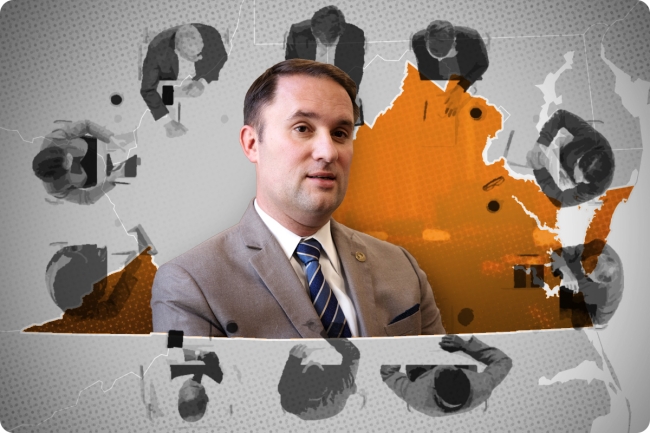You have /5 articles left.
Sign up for a free account or log in.

Photo illustration by Justin Morrison/Inside Higher Ed | Julia Rendleman/The Washington Post/Getty Images | Rawpixel
Virginians take great pride in our commonwealth’s esteemed higher education system, widely recognized as one of the finest in the United States. As a proud product of Virginia’s public schools—having completed my undergraduate studies at James Madison University and my law degree at the College of William & Mary—I can personally attest to the success of a system that prioritizes public service over institutional self-interest. Instead of stoking competition for students and resources, Virginia’s public colleges and universities collaborate to offer a wealth of opportunities.
A recent Inside Higher Ed opinion piece, “The Politicized Governing Board,” critiques my 2023 attorney general opinion concerning governance at George Mason University and other Virginia public colleges and universities. In the process, the authors exhibit a fundamental misunderstanding of Virginia law, the plain language of the Virginia Code and basic principles of governance.
It is crucial to understand that every Virginia public university is established, funded and controlled by the commonwealth of Virginia. The state purchased the land on which these institutions are built, legislated their authorization into the Virginia Code and allocates billions of taxpayer dollars to our higher education system each budget cycle. Every employee is a state employee and is treated as such by the Virginia Retirement System. The governance of these universities is overseen by Boards of Visitors, whose members are appointed by the governor and confirmed by the Virginia General Assembly. These are not private institutions, but state entities created, maintained and funded by the state.
In October 2023, my office responded to a request from Governor Glenn Youngkin for an advisory opinion. The question posed to the Office of the Attorney General was straightforward: Are the boards of state universities obligated primarily to the commonwealth as a whole, or should their responsibilities be confined to their respective institutions? Though the authors of “A Politicized Governing Board” and others may suggest otherwise, a basic analysis of Virginia law reveals that this is not a close debate.
The Virginia Code explicitly requires newly appointed Board of Visitor members to participate in training to understand that their “primary duty [is] to the citizens of the Commonwealth” (Virginia Code Section 23.1-1304). This language was codified, with broad bipartisan support, under a Democratic-controlled House of Delegates, a Democratic-controlled State Senate and a Democratic governor.
In short, while Boards of Visitors oversee individual institutions, their paramount duty is to the commonwealth of Virginia. This is not controversial; it reflects the reality that these institutions—created, funded, maintained and overseen by the state—owe their primary obligation to the commonwealth of Virginia.
Virginia law consistently treats these institutions as integral parts of our state government. They are not merely educational entities but public corporations, serving the public good rather than narrow, self-serving agendas. As state agencies, they are covered under sovereign immunity and subject to open meeting laws. Although each institution is separately authorized under the Virginia Code, they are collectively subject to the authority of the State Council of Higher Education, which must approve any changes to the mission statement of any college or university. This ensures that each institution contributes to the broader goal of providing higher education in Virginia.
In conclusion, the authors of “The Politicized Governing Board” err in suggesting the opinion “essentially overturned years of precedent.” A rudimentary review of Virginia law and legislative history or an objective reading of the plain language of the law should easily clear up any misunderstandings on the matter.




